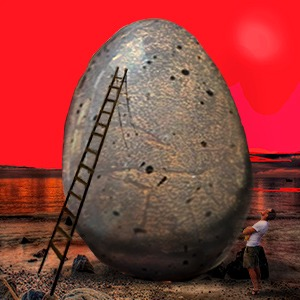You have no items in your cart. Want to get some nice things?
Go shopping
The ancient Picts, who inhabited northern Scotland before its conquest by the Celts, had a legend about an infinite continent scattered with eggs. These eggs were of gargantuan proportions and hard as granite cliffs. Each egg housed the soul of a living human. If you managed to find your egg and crack it open, you’d gain an immortal soul and become a god. “God” for the Picts was the embodiment of absolute freedom. Of these gods’ lives the Picts knew nothing. Those who became gods did not, it would seem, return to their native tribe.
Suppose our eggs still lie scattered throughout the boundless earth; why not set out in search of them? I’d long assumed people didn’t know they existed. But recent conversations with friends have proven otherwise. Everyone had known: this was news to me alone. Strange, then, that we hadn’t all long since embarked upon the hunt. Could it be that no one among us wishes to become a god?
Six months ago, I packed my suitcase, hoisted a heavy Indian knapsack onto my back, and set out for the continent. As it turned out, an immense quantity of unclaimed eggs really did lie strewn across the land, awaiting their owners. What’s more, I happened upon countless travelers who’d already spent long years hoping and searching. I even encountered a handful of people who’d been lucky enough to have tracked down their egg. Oddly, though, they found themselves faltering. They tapped away at the stone shells with little iron hammers in an attempt to wake their souls. But not one of them could muster up the nerve to smash the granite.
Six months of concerted searching have, alas, yielded naught: I am yet to find my egg. But a thought keeps gnawing away at me: what will I do if I end up striking it lucky?.. Perhaps I too shan’t venture to become a god?
About the Translator
Leo Shtutin is a translator and writer based in London. He has translated essays and articles for online publications such as openDemocracy and The Calvert Journal. He has also translated several full-length works, including Death of a Prototype, a novel by Victor Beilis (Anthem Press, 2017), and Emergence of a Hero, an academic book by Andrei Zorin (Oxford University Press, 2023). His monograph Spatiality and Subjecthood in Mallarmé, Apollinaire, Maeterlinck, and Jarry: Between Page and Stage was published by Oxford University Press in 2019.
About Jonathan Vidgop
Jonathan Vidgop is a theatre director, author, screenwriter, and founder of the Am haZikaron Institute for Science and Heritage of the Jewish People in Tel-Aviv, Israel. Born in Leningrad in 1955, Jonathan was expelled in 1974 from what is now called the Saint-Petersburg State University of Culture and Arts “for behavior unworthy of the title of Soviet student.” Having worked as a locksmith, loader, and White Sea sailor, he was drafted into the army and sent to serve in the Arctic Circle. He is the author of several books. Two chapters from his latest novel, Testimony, published by the leading Russian Publishing House NLO, “Birdfall” and “Man of Letters,” were published in English in Goats Milk Magazine and The CHILLFILTR Review. A story was recently accepted by Los Angeles Review, and another by Pembroke Magazine. The story “Nomads” is the recent winner of the Meridian’s Editors’ Prize in Prose. Vidgop's last publication in the Singaporean Kitaab was also published by the Japanese Kaidankai.




